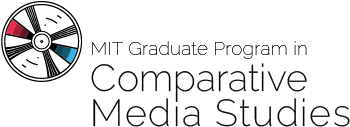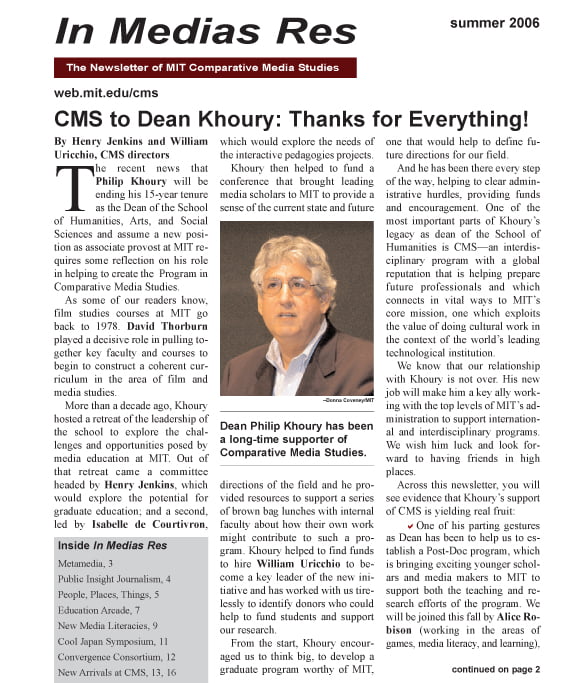

The recent news that Philip Khoury will be ending his 15-year tenure as the Dean of the School of Humanities, Arts, and Social Sciences and assume a new position as associate provost at MIT requires some reflection on his role in helping to create the Program in Comparative Media Studies.
As some of our readers know, film studies courses at MIT go back to 1978. David Thorburn played a decisive role in pulling together key faculty and courses to begin to construct a coherent curriculum in the area of film and media studies.
More than a decade ago, Khoury hosted a retreat of the leadership of the school to explore the challenges and opportunities posed by media education at MIT. Out of that retreat came a committee headed by Henry Jenkins, which would explore the potential for graduate education; and a second, led by Isabelle de Courtivron, which would explore the needs of the interactive pedagogies projects.
Khoury then helped to fund a conference that brought leading media scholars to MIT to provide a sense of the current state and future directions of the field and he provided resources to support a series of brown bag lunches with internal faculty about how their own work might contribute to such a program. Khoury helped to find funds to hire William Uricchio to become a key leader of the new initiative and has worked with us tirelessly to identify donors who could help to fund students and support our research.

From the start, Khoury encouraged us to think big, to develop a graduate program worthy of MIT, one that would help to define future directions for our field.
- And he has been there every step of the way, helping to clear administrative hurdles, providing funds and encouragement. One of the most important parts of Khoury’s legacy as dean of the School of Humanities is CMS—an interdisciplinary program with a global reputation that is helping prepare future professionals and which connects in vital ways to MIT’s core mission, one which exploits the value of doing cultural work in the context of the world’s leading technological institution.
- We know that our relationship with Khoury is not over. His new job will make him a key ally working with the top levels of MIT’s administration to support international and interdisciplinary programs. We wish him luck and look forward to having friends in high places.
- Across this newsletter, you will see evidence that Khoury’s support of CMS is yielding real fruit:
- One of his parting gestures as Dean has been to help us to establish a Post-Doc program, which is bringing exciting younger scholars and media makers to MIT to support both the teaching and research efforts of the program. We will be joined this fall by Alice Robison (working in the areas of games, media literacy, and learning), Hugo Liu (working in the area of taste cultures, aesthetics, and computational media), and Joshua Green (working in the areas of creative industries and convergence culture). Khoury was also instrumental in helping us to get support to bring Frank Espinoza as a Martin Luther King Jr. visiting scholar to MIT next year to teach courses in the area of character design and world building.
- This past year has seen a bumper crop of promotions for core faculty who have been involved with CMS through the years, many of whom were recruited under Khoury’s leadership. Congrats to Junot Diaz, Eric Klopfer, Ian Condry and Christine Walley who all received promotion or tenure this term.
- This issue contains reports from several recent alums of the program — Joellen Easton (on the graduate level) and Nick Hunter (on the undergraduate level) giving testimony to the impact this program has had on their professional development. These are only two of the many stories we are hearing from our alums and we hope to share more with you in future issues.
- This issue reports on recent successes across the program’s core research initiatives — the field testing of work in Project NML, the successful conference hosted by the Convergence Culture Consortium, the many archives built and deployed by Metamedia, and the early work being done on the Games to Go project. Each demonstrates the value of applied humanism at work.
- This issue describes some of the faculty’s innovative new approaches to media education, including Condry’s Cool Japan project and Edward Barrett’s new efforts in the area of mobile media.
- And read between the lines here, you will see signs of what promise to be new developments on the horizon—potential research collaborations with Singapore, new partnerships through C3, and an extended new phase of work with MacArthur on media literacy.
Dean (soon to be Associate Provost) Khoury, thanks again for your vision, leadership, and support during the rocky early years of the program.
We look forward to working with you in your new position and to forging a partnership with a new dean as we chart our course for the next few years.



